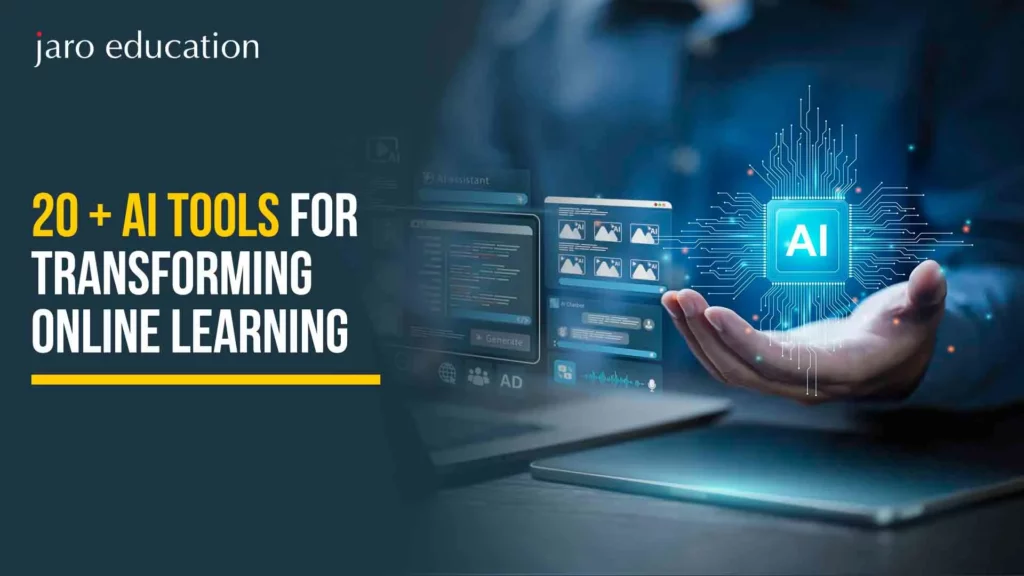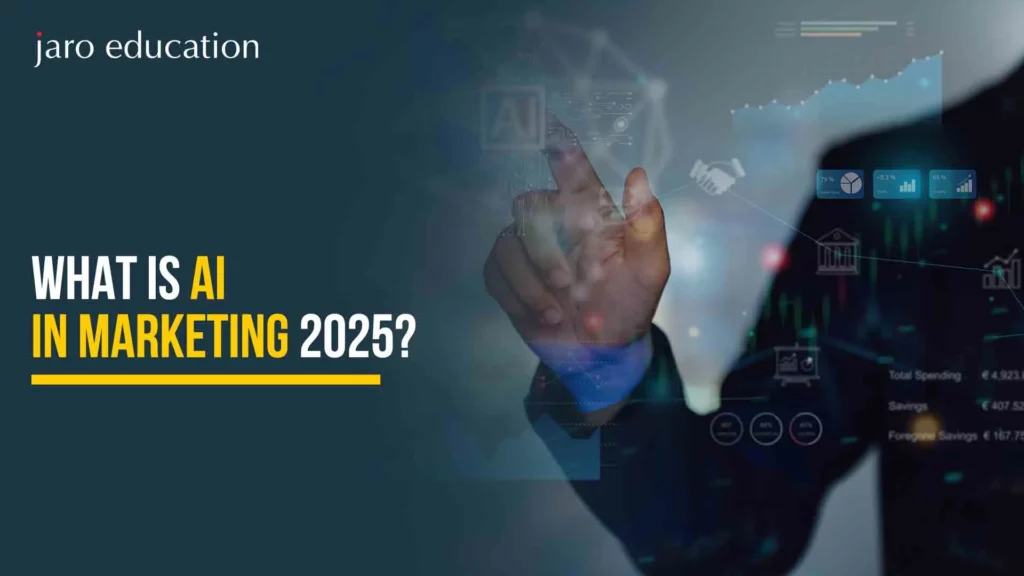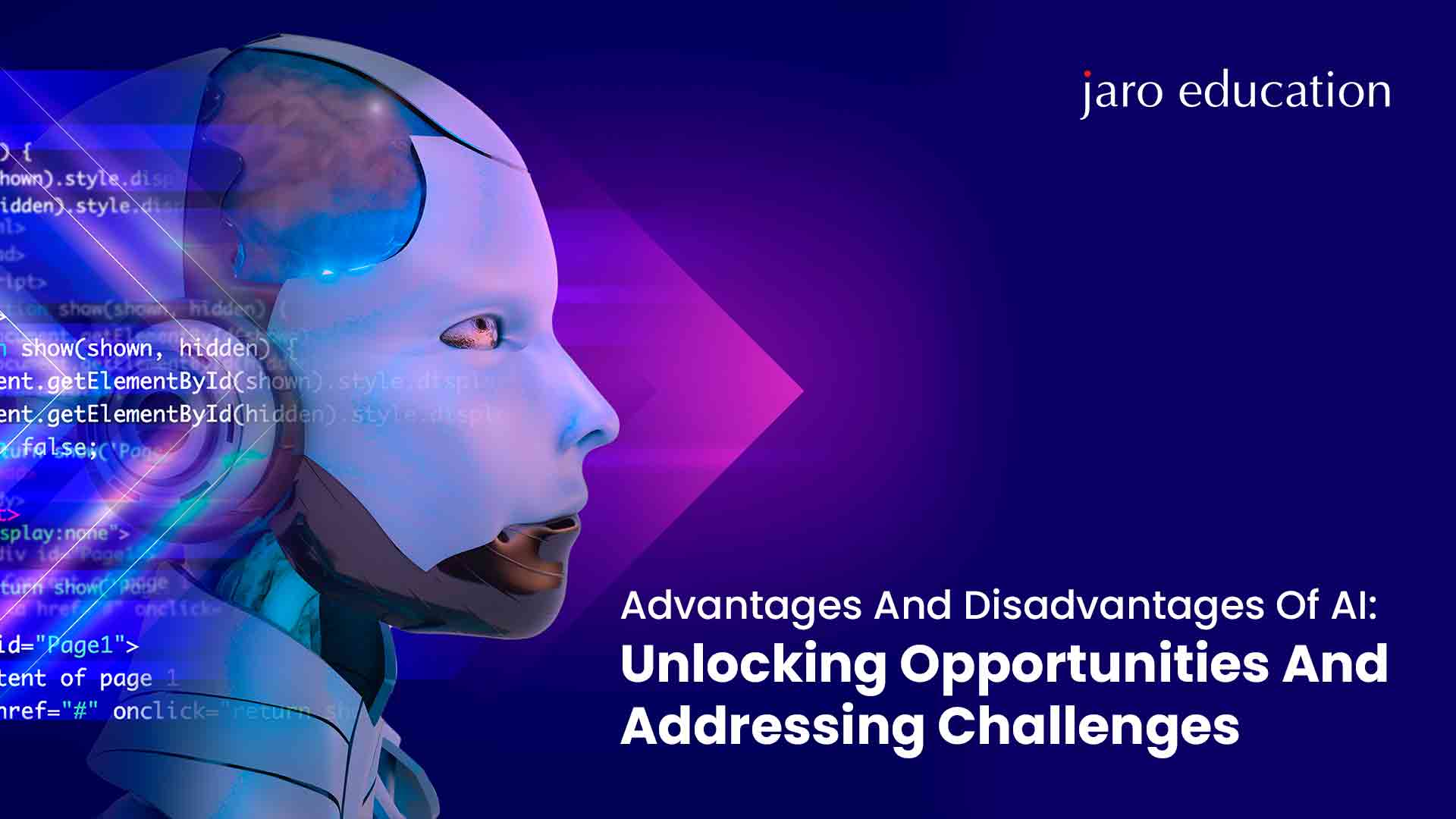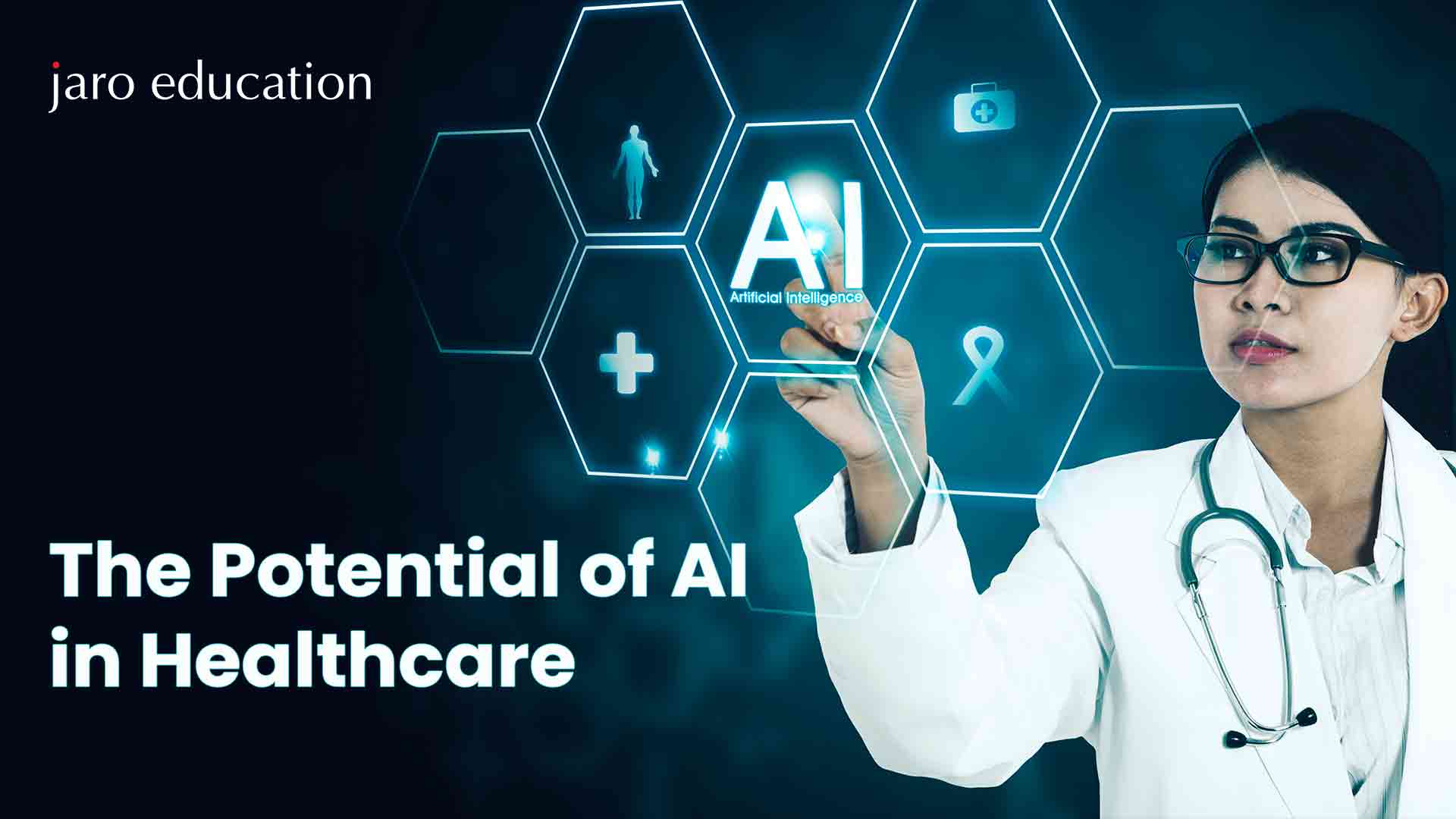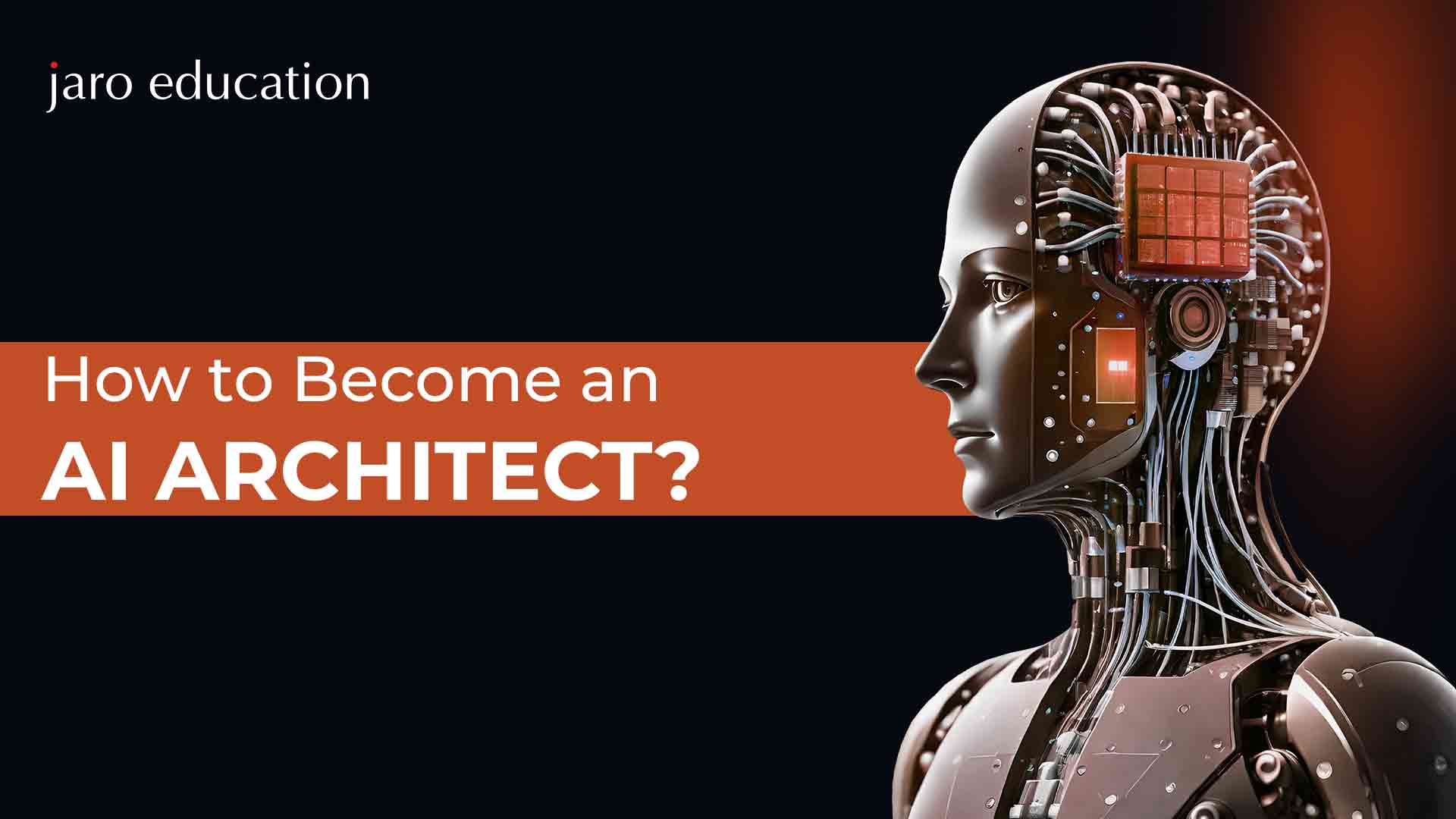Artificial Intelligence in Education: Opportunities and Challenges
Table of Contents
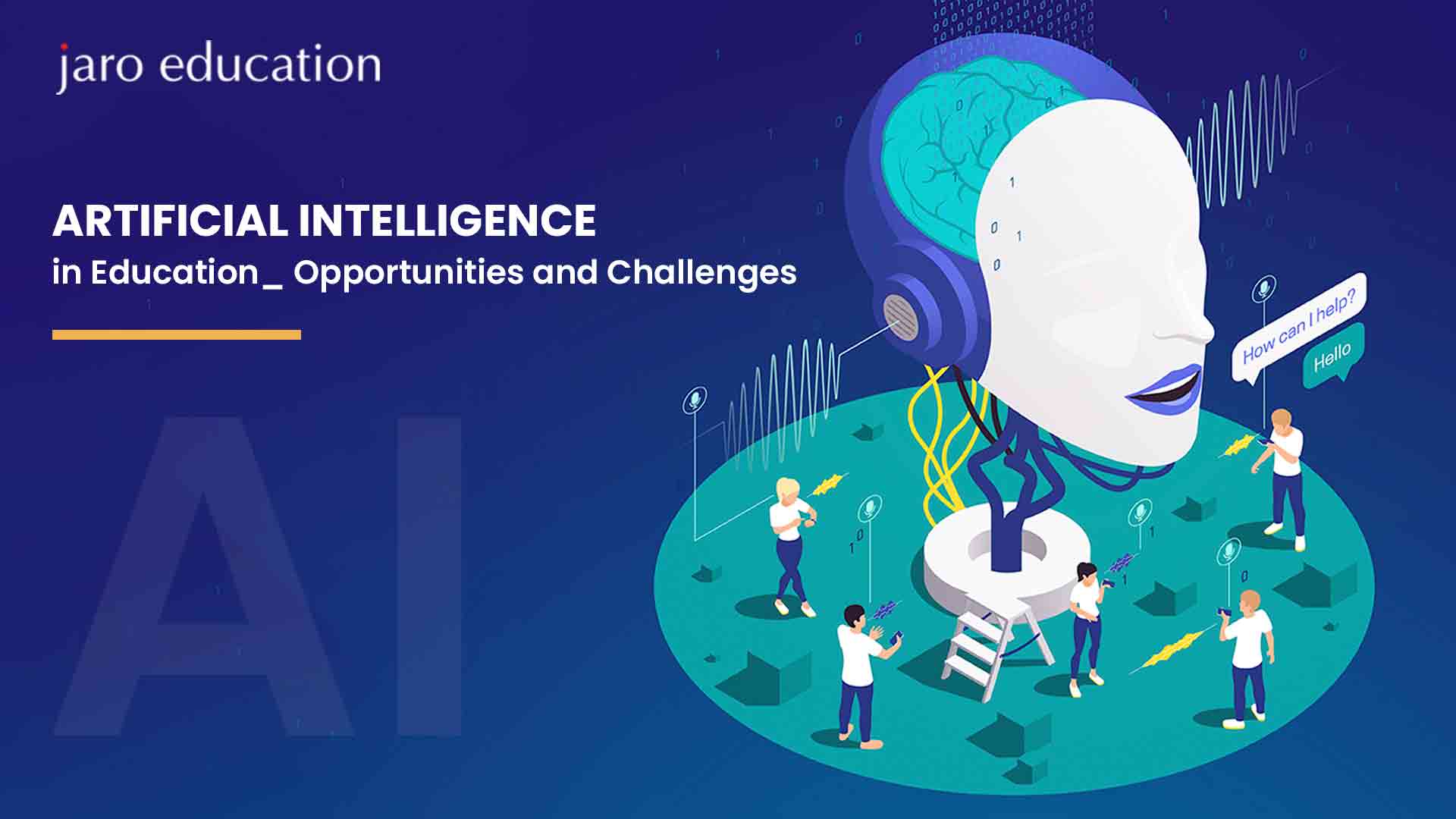
- jaro education
- 21, October 2024
- 11:00 am
Artificial intelligence (AI) in education is revolutionizing how students learn and teachers instruct. The integration of artificial intelligence learning systems not only presents numerous education AI opportunities, but also comes with challenges of AI in education that need careful consideration. As schools and universities across the world embrace this technology, understanding the full impact of AI in education is essential for maximizing its benefits and eliminating its drawbacks.
Role of AI in Education
Artificial intelligence has the potential to transform the field of education significantly. By automating administrative tasks, personalizing learning experiences, and providing real-time data analysis, AI in education offers multiple benefits. This technology can help educators identify learning gaps, tailor instructions to individual student needs, and improve overall educational outcomes.
Personalized Learning
One of the most significant education AI opportunities is personalized learning. AI algorithms can analyze students’ learning patterns and customize educational content to suit individual needs. This approach ensures that every student receives instruction that matches his/her pace and learning style, improving the overall acade
Administrative Efficiency
Artificial intelligence learning tools can streamline administrative processes, freeing up educators to focus more on teaching. Tasks such as grading, scheduling, and student progress tracking can be efficiently managed by AI, reducing the administrative burden on teachers and allowing them to dedicate more time to instructional activities.
Better Student Engagement
AI-powered educational tools can make learning more engaging and interactive. Through the use of virtual tutors, gamified learning platforms, and adaptive learning technologies, students are more likely to remain engaged and motivated. With the use of AI in education these tools can provide immediate feedback, helping students to stay on track and understand their mistakes.
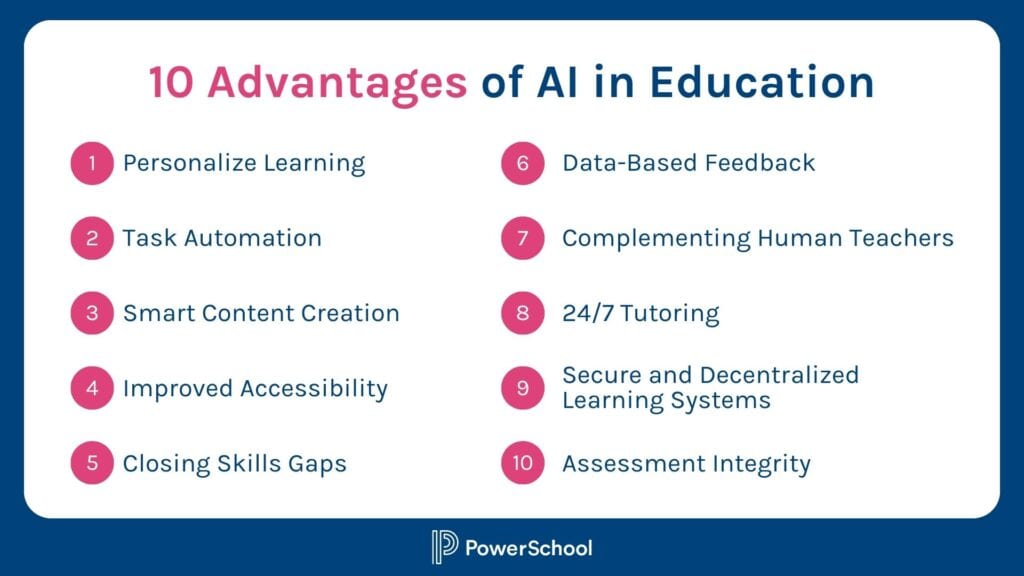
*powerschool.com
Opportunities of AI in Education
The implementation of AI in education presents several opportunities that can improve the learning experience and provide better educational outcomes.
- Data-driven Insights: AI in education can analyze vast amounts of data to provide insights into student performance and behavior. These insights can help educators develop targeted interventions to support students who may be struggling. Through the identification of common patterns and trends, AI in education can assist in creating more effective teaching strategies and learning environments.
- Accessibility and Inclusivity: AI technologies can make education more accessible to students with disabilities. Tools such as speech-to-text, text-to-speech, and real-time translation can break down barriers for students with visual, auditory, or language challenges. This inclusivity ensures that all students have the opportunity to succeed in their educational pursuits.
- Lifelong Learning: The integration of AI in education is not limited to traditional classroom settings. Lifelong learning opportunities are provided through online courses, professional development courses, and self-paced learning modules powered by AI. This flexibility allows individuals to continue their education and skill development at any stage of life.
AI in the Classroom: Practical Applications
Integrating artificial intelligence learning tools in the classroom can revolutionize the way education is delivered. Here are some practical applications of AI in education that are already making a huge difference:
Intelligent Tutoring Systems
Intelligent tutoring systems (ITS) use AI to provide personalized instruction and feedback to students. These systems can adapt to each student’s individual learning pace, offering customized support and resources. For example, an ITS can help a student struggling with math concepts by providing additional practice problems and step-by-step solutions.
Automated Grading and Feedback
AI-powered grading systems can save teachers a significant amount of time by automating the assessment process. These systems can grade multiple-choice tests and essays, and even provide detailed feedback on student performance. This not only speeds up the grading process but also ensures consistency and reduces human error.
Virtual Classrooms and AI Assistants
AI-powered grading systems can save teachers a significant amount of time by automating the assessment process. These systems can grade multiple-choice tests and essays, and even provide detailed feedback on student performance. This not only speeds up the grading process but also ensures consistency and reduces human error.
Addressing the Ethical Implications
The deployment of AI in education brings forth several ethical considerations that need to be addressed to ensure responsible use of the technology.
- Transparency and Accountability: One of the key ethical challenges of AI in education is ensuring transparency and accountability in the use of AI systems. Educators and administrators must understand how AI algorithms make decisions and ensure these processes are transparent to students and parents. Establishing clear guidelines and accountability measures is essential to maintain trust in AI-driven educational tools.
- Bias and Fairness: AI systems can inadvertently perpetuate biases present in the data on which they are trained. It is crucial to ensure that AI in education is designed and implemented with fairness in mind, avoiding any discrimination based on race, gender, or socio-economic status. Regular audits and updates to AI algorithms can help reduce these biases and promote fairness.
- Ethical Use of Student Data: The ethical use of student data is essential when integrating AI in education. Policies must be in place to protect student privacy and ensure data is used responsibly. Consent from students and parents should be obtained, and data should be anonymized wherever possible to prevent misuse.
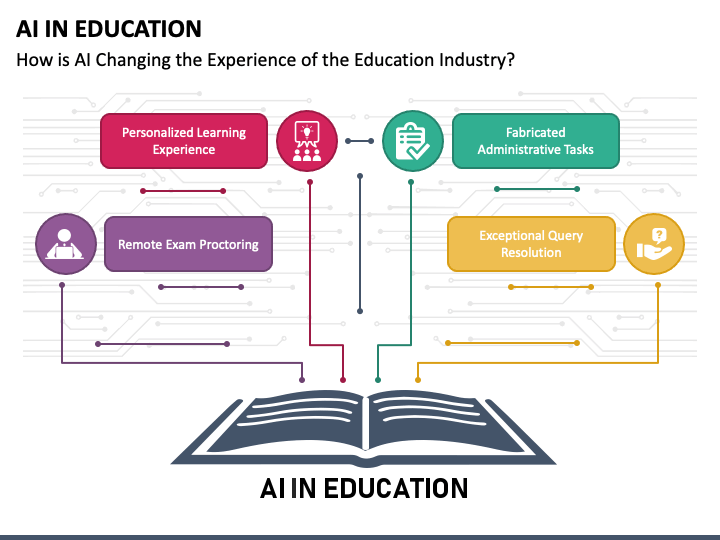
*google.com
Challenges of AI in Education
Despite the numerous benefits, the integration of AI in education comes with challenges that must be addressed to ensure its successful implementation.
Data Privacy and Security
One of the primary challenges of AI in education is ensuring the privacy and security of student data. With the increasing use of AI-powered tools, vast amounts of personal and academic data are collected and analyzed. Protecting this data from breaches and ensuring it is used ethically is crucial for maintaining trust and safeguarding student information.
Equal Accessibility
While AI in education offers many advantages, there is a risk of intensifying existing inequalities. Not all students have equal access to the necessary technology and internet connectivity required for AI-driven learning tools. Addressing this digital divide is essential to ensure that all students benefit from the opportunities provided by AI in education.
Teacher Training and Adaptation
The successful integration of AI in education requires that teachers are adequately trained to use these technologies effectively. Professional development courses must be established to help educators understand and implement AI tools in their teaching practices. Additionally, there may be resistance to change, and it is important to support teachers in adapting to new methods of instruction.
How to Overcome the Challenges of AI in Education?
Addressing the challenges of AI in education is crucial for its successful implementation. Here are some strategies to overcome these challenges and maximize the benefits of AI in education:
- Investing in Infrastructure: To ensure that all students have access to AI-driven educational tools, it is essential to invest in the necessary infrastructure. This includes providing reliable internet connectivity, access to devices, and technical support. Government initiatives and public-private partnerships can play a significant role in bridging the digital divide and ensuring equitable access to AI in education.
- Teacher Training and Professional Development: Effective implementation of AI in education requires well-trained educators who are comfortable using AI tools. Professional development courses should be established to equip teachers with the skills and knowledge needed to integrate AI into their teaching practices. Ongoing support and training can help teachers adapt to new technologies and maximize their potential.
- Data Privacy and Security: Protecting student data is a top priority when using AI in education. Robust data privacy policies and security measures must be in place to safeguard sensitive information. Schools and educational institutions should work with technology providers to ensure that data is handled ethically and securely.
Future Prospects of AI in Education
The future of AI in education looks promising, with advancements expected to further improve learning experiences and outcomes. Here are some potential developments that could shape the future of AI in education:
Adaptive Learning Platforms
Adaptive learning platforms powered by AI are designed to adjust the content and delivery of lessons based on individual student performance and preferences. These platforms can continuously analyze data to provide personalized recommendations, ensuring that each student receives the most effective instruction. This approach not only improves understanding but also keeps students engaged.
Predictive Analytics for Student Success
AI in education can utilize predictive analytics to identify students at risk of falling behind or dropping out. AI systems can predict potential issues and alert educators to intervene early by analyzing data such as attendance, grades, and engagement levels. This proactive approach can significantly improve student retention and success rates.
AI-driven Content Creation
AI can assist in creating educational content tailored to specific learning objectives. For instance, AI algorithms can generate practice exercises, quizzes, and even entire lesson plans based on the curriculum. This automation allows teachers to focus more on instruction and less on content creation, boosting the overall efficiency of the educational process.
Virtual Reality and Augmented Reality
The integration of AI with virtual reality (VR) and augmented reality (AR) technologies can create immersive learning experiences. For example, students can take virtual field trips to historical sites or explore complex scientific concepts through interactive simulations. These technologies, powered by AI, can make learning more engaging and impactful.
Conclusion
Artificial intelligence in education offers transformative opportunities to improve learning experiences, better educational outcomes, and promote inclusivity. With the use of AI in education, educators can provide personalized instruction, streamline administrative tasks, and gain valuable insights into student performance.
However, it is crucial to address the challenges of AI in education, including data privacy, equity, and teacher training, to ensure its successful implementation. As we continue to explore the potential of AI in education, it is essential to prioritize ethical considerations and work towards creating an inclusive and equitable educational environment.
By embracing the opportunities and overcoming the challenges, we can harness the power of AI in education to create a brighter future for students all around the world. Join Jaro Education today to learn more about AI in education.
Frequently Asked Questions
By providing personalized learning, automating administrative tasks, and offering real-time feedback, AI is transforming the classroom. AI in education also supports adaptive learning technologies and virtual tutors, enhancing both teaching and student engagement.
The potential to personalize learning, streamline administrative tasks, and boost student engagement positions AI in education as a key driver for future advancements. By addressing existing challenges, AI in education can revolutionize teaching methods and significantly improve educational outcomes worldwide.
AI in education is used for personalized learning, automating administrative tasks, providing real-time data analysis, and creating intelligent tutoring systems. It helps tailor educational content to individual student needs, enhancing engagement and academic performance.

